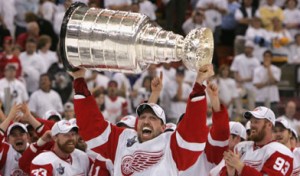With the conference finals in full swing, there is only one thing that is certain the rest of the way. One of Joe Thornton, Henrik Sedin, Vinny Lecavalier or Zdeno Chara will get the opportunity to be the first player on his team to lift the Stanley Cup (as tradition goes, the captain gets it first). Then, after accepting the Cup from Gary Bettman, raising the chalice and starting the victory lap, they will have an important decision to make. One of the underrated aspects of winning the championship is who gets the Stanley Cup second. Most often it is the guy who has waited the longest to win it or who has had the biggest impact on the team. Here is a look at the past five players who got the handoff from the captain.

After being on the losing side to two consecutive Red Wings/Penguins finals, Marian Hossa signed on with the Chicago Blackhawks looking for the elusive championship. The three-time 40-goal scorer is one of the top two-way players of this generation, but the closest he had been to winning the Stanley Cup before losing those two years was an appearance in the 2003 Eastern Conference final. After a poor start to the playoffs when he nearly caused the Hawks to go down 3-1 in the first round to the Nashville Predators by taking a boarding major with just over a minute to go in Game 5 and the Hawks down by one. Patrick Kane managed to tie the game shorthanded and Hossa potted the winner in overtime. While he only recorded three goals and 15 points in 22 playoff games, his defensive play and strong efforts inspired his teammates and Jonathan Toews erased two years of pain when he passed Hossa the Cup.
In what turned out to be one of the best trade-deadline deals ever, Bill Guerin arrived in Pittsburgh after spending a season-and-a-half with the lowly New York Islanders. Going into the playoffs as a 39-year-old, Guerin provided the leadership, veteran know-how and physical play they lacked in their run the year before. He had the best playoff of his career, tying career highs of seven goals, eight assists and setting highs of 15 points and a plus-8. He scored at important times too. Guerin had two points (1G-1A) on goals that tied a game, three points (2G-1A) on game-winning goals, four points (1G-3A) on the first goal of the games and nine points (3G-6A) on goals the put the Penguins ahead. Sidney Crosby rewarded Guerin by passing him the Stanley Cup, his first in 13 years.

Dallas Drake was a 16-year veteran coming back to Detroit for one final chance to win the Stanley Cup. Originally drafted by the Red Wings in 1989, he was traded to Winnipeg during the 1993-94 season, right before they went on a run of four Cup final appearances in eight seasons. Drake was a heart-and-soul player that teams can’t win without. He killed penalties, hit, blocked shots and gave his teams a ton of energy. He played his 1,000th career game during the 2007-08 season and the closest he had ever been to the Stanley Cup was in 2000-01 when his St. Louis Blues lost the Western Conference final to the Colorado Avalanche in five games. After Nicklas Lidstrom became the first European captain to win the Cup, he let Drake carry the Cup second in the last game of his career.
Rob and Scott Niedermayer took brother feuds to a new level in 2003 when the Ducks and Devils faced off in the Stanley Cup final. What made it more intriguing was the fact their mother was openly rooting for Rob. After all, he had yet to win it all while Scott had already won it twice. Scott would win again in 2003, but would make up for it four years later. His contract was over after the lockout and he decided to sign with Anaheim instead of New Jersey, where he had played the first 13 seasons of his career, so he could play with his brother. Scott made his mom happy, handing the Cup to Rob first. Two all-time greats, Chris Pronger and Teemu Selanne, would be the next players to host the Cup, also for the first time in their careers.
Steady, reliable defensemen are virtues on any team. Prior to the 2006 playoffs, Glen Wesley had played 1,311 regular season and 144 playoff games. He had been to the Stanley Cup final three times, losing every time and had been a presence on the Hurricanes blueline since the 1995 season, with the exception of seven games played for the Toronto Maple Leafs at the end of 2002-03. After Rod Brind’Amour grabbed the Cup away from Gary Bettman after their seven-game triumph over the Edmonton Oilers (the third time Wesley went up against Edmonton in the final) he passed the Cup to Wesley in the aftermath of his last career playoff game.
With a simple handoff, one captain will reward a player for his longevity, contribution to the team and dedication to winning. Who will that player be? Here is a look at some good possibilities.
Boston Bruins – Tim Thomas Few have worked harder to reach the NHL than Thomas. After a solid career at the University of Vermont that ended in 1997, he spent the next eight seasons toiling in the minors and honing his craft in Europe while getting four games of NHL experience in that span. He finally got his opportunity for a full-time NHL job after the lockout, but general consensus was he would be back in Europe before long. While stopping the puck by any means necessary a la Dominic Hasek, he won the Vezina Trophy in 2009, set the single-season save percentage record with a .938 mark this season and has a record of 158-101-44 since 2006. He has also become one of the most popular players in the league. The 37-year-old is getting better and set a career high with 52 saves in Game 2 of Boston’s second round series against Philadelphia. Goalies aren’t often among the first to get the Cup, but Thomas has defied the odds before.
San Jose Sharks – Patrick Marleau The former captain is the best player in the history of the franchise. Marleau has played 364 more games for the Sharks than any other player, has 151 more goals and 219 more points than second on the list. He has faced a ton of scrutiny for playoff failures in the past even though his goals per game average in the postseason (.405) is much higher than in the regular season (.345). It would be appropriate for him to be the first player after Joe Thornton to raise the Cupsince he was the first player to be selected after Thornton was taken first overall in 1997.
Tampa Bay Lightning – Mattias Ohlund There are a number of players on Tampa Bay who have had solid careers without winning the Stanley Cup, including Dwayne Roloson, Eric Brewer and Simon Gagne. At 909 games played, Ohlund has played more games than any of those players. And while Brewer and Roloson came over in trades this season and Gagne is in his first season in Florida, Ohlund was with the Bolts last season and went a long way towards solidifying their blueline. If it isn’t Ohlund, it should be Roloson who went to the final in 2006, but a knee injury in Game 1 prevented him from finishing the job he started with the Oilers. Edmonton made it to Game 7 using their third-string goalie Jussi Markkanen, so they could have pulled out a win using Roloson who had a .927 save percentage and 2.33 goals-against average at the time and those numbers are even better this year for the 41-year-old.
Vancouver Canucks – Sami Salo Most likely Henrik Sedin will pass the Cup off to his brother Daniel the same way Scott Niedermayer passed it to Rob. There wouldn’t be anything wrong with that, but if he were to base his decision on who has waited the longest and sacrificed the most, it would have to go to Salo. The oldest player on the team and one of only two Canucks (Roberto Luongo being the other) to have been in the NHL since the 1990s, he is the third longest tenured Canuck after the Sedins, having been in Vancouver since 2002-03. A myriad of injuries has allowed him to just 75.7% (497 of 656) of games over that span, showing how willing he is to sacrifice his body for the team. His injury history includes 23 games for a shoulder injury in 2005-06, nine games with a wrist injury and eight with a broken nose in 2006-07, 15 games with broken ribs and seven with a sprained MCL in 2008-09 and 55 games this season with a torn Achilles’ tendon. Henrik can make all that pain worthwhile by passing him the Cup should they take it in June.
Pronger has a new paragaph in his contract that forbids him from lifting anything over his head, including the Stanley Cup. this is based on his most recent back operation. You forgot to mention Gagne, he has a real possibility right now.
Good article!